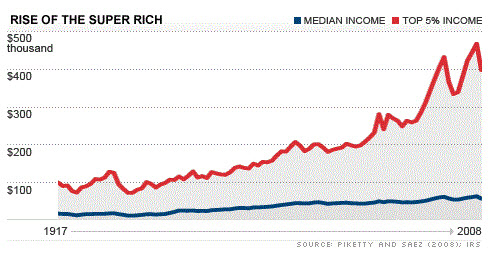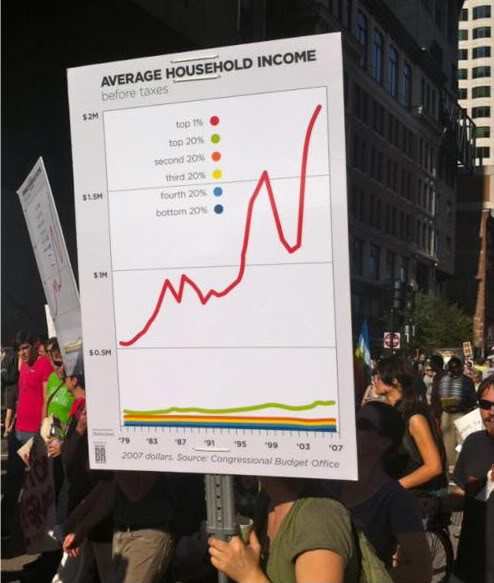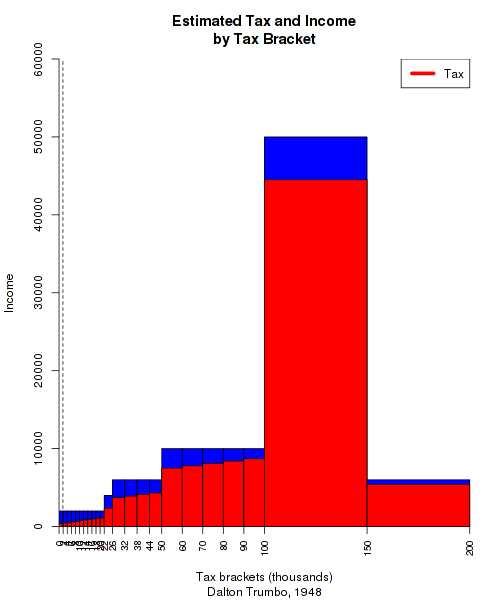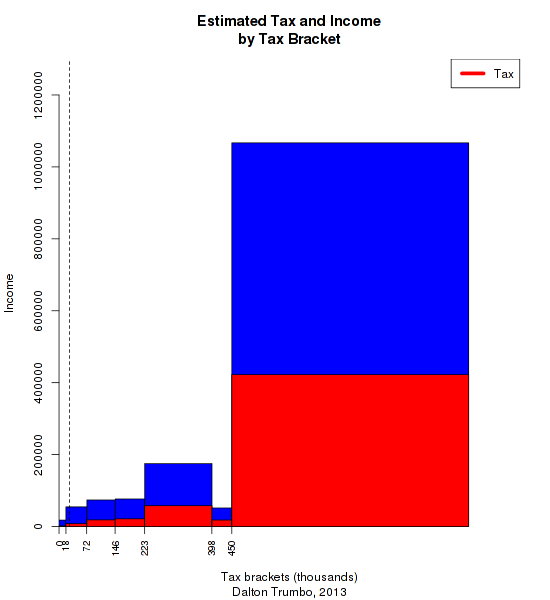Stay Classy
June 24th, 2014 | Published in Feminism, Political Economy, Politics, Socialism | 7 Comments
There's a passage from [Barabara Ehrenreich](http://www2.metrotimes.com/news/story.asp?id=12327) that I used to find very powerful.
> The original radical . . . vision was of a society without hierarchies of any kind. This of course means equality among the races and the genders, but class is different: There can be no such thing as "equality among the classes." The abolition of hierarchy demands not only racial and gender equality, but the abolition of class.
Many still find this formulation appealing, judging by the frequency with which I see similar sentiments expressed by my peers. And I still find it beguiling as well. But over the years I've come to see that it's fundamentally wrong, and encourages a very misleading way of thinking about how class works.
Ehrenreich's framework is common among those who decry "identity" politics, and insist on the unifying and universalizing qualities of *class*, as against race and gender, as a banner under which to rally the Left. Sam Gindin, in his generally excellent [contribution](https://www.jacobinmag.com/2014/06/unmaking-global-capitalism/) to the most recent *Jacobin*, accuses "identity politics" of "parsing the working class into ever more fragmented subgroups". He insists that identities "cannot combine into a new politics because their essence is their separateness. Something else is needed to bring them together in a broader, more integrated, and more coherent politics", and "that 'something' is class." He concludes that "class trumps, without underplaying, issues of identity."
Walter Benn Michaels, tireless critic of liberal race and gender politics, uses similar [language](http://edges.gmu.edu/interview-walter-benn-michaels/). For him, "battles over gender, race, and sexuality are battles against discrimination". This makes them utterly incommensurable with struggles over class, which "has nothing whatsoever to do with discrimination; it has to do with exploitation." Class is different, he says, because it is "a fundamentally unequal relation". Thus, while anti-racism or feminism insist only on equality between races or genders, class struggle differs in its insistence on *abolishing* the class distinction.
This kind of rhetoric relies on a flimsy and inadequate reading not just of race and gender, but of class as well. In order to portray class as the unifying symbol, and all other identities as merely divisive, it must juxtapose categories at completely different levels of analysis. It simultaneously neglects the way in which race and gender are part of social systems and not just individual identities, while ignoring the way that class, too, functions at the level of identity politics.
***
Ehrenreich, Gindin, and Michaels seemingly have no vision of anti-racism or feminism beyond the horizon of liberal tolerance. The only endpoint they can see is "equality among the races and the genders", which, as Gindin points out, implies that the "essence" of these groups "is their separateness". But they are the ones essentializing separateness, ignoring a whole tradition of activists and writers for whom the goal is not merely equality but the *abolition* of both race and gender.
You'd never know from these discussions that anyone had ever [troubled](http://binarythis.com/2013/05/23/judith-butler-explained-with-cats/) the gender binary. Among radical feminists, there has always been a current that sees the ultimate aim *not* as an equality between hypostatized essences, but as the [elimination](http://themcnamarareport.wordpress.com/2012/08/24/in-a-radical-feminist-world-there-is-no-transphobia-guest-post-on-zinniajones-com/) of the gender binary entirely.
In some versions, this can veer into calls for androgyny that have some uncomfortable [Harrison Bergeron](https://en.wikipedia.org/wiki/Harrison_Bergeron) overtones. But one can just as easily follow the path of [Silvia Federici](http://www.metamute.org/editorial/articles/permanent-reproductive-crisis-interview-silvia-federici), who calls it "absurd to assume that any form of gender specification must always, necessarily become a means of exploitation and we must live in a genderless world." This suggests that her utopia is a world in which gender differences don't disappear, they merely lose their function as categories of hierarchy and oppression. The performance of gender could then become more fluid, playful, and theatrical, following the models set down by queer and transgender cultures.
Likewise, radical understandings of race have viewed it as a social construct inseparable from the origins of capitalism, with "black" and "white" representing a dichotomy that must be overcome just as much as---or along with---the opposition between labor and capital. Barbara and Karen Fields demonstrate that racial categorizations are not pre-given, but must be painstakingly reproduced through a political and discursive practice of ["racecraft"](http://www.amazon.com/Racecraft-Soul-Inequality-American-Life-ebook/dp/B007LCYZCE). "The social alchemy of racecraft", they write, "transforms racism into race, disguising collective social practice as inborn individual traits, so it entrenches racism in a category to itself, setting it apart from inequality in other guises."
In a much older work emerging from the Communist tradition, Ted Allen wrote of the ["invention of the white race"](http://clogic.eserver.org/1-2/allen.html), and insisted that the "race" was not a biological phenotype, nor merely even a "social construct", but "a *ruling class social control formation*." No wonder, then, that Allen's research led followers like Noel Ignatiev to [demand](http://racetraitor.org/abolishthepoint.html) the "abolition of whiteness".
***
If all this goes to show that there is far more to anti-racism and feminism than liberal diversity politics, the notion of "class" evoked by the writers cited above can be attacked from the other directiosn. Ehrenreich, et al, speak of class strictly as an abstract *social structure*, and race and gender solely as individual *identities*. Yet each exists in both dimensions.
In an old essay at *Jacobin*, I tried to unpack the [dual meanings](https://www.jacobinmag.com/2012/11/an-imagined-community/) that "class" holds in the socialist imagination. Writers like Sam Gindin evoke "the working class" as the collective agent that can bring about universal liberation. But what does this term signify? Rather than trying to restate the point, I'll just quote myself on the curious career of "the working class" in leftist rhetoric:
> It did not simply mean class in the structural sense: workers who survive by selling their wage labor, confronting capitalists whose wealth comes from hiring that labor and producing for profit. The working class in that sense encompasses the vast majority even in the rich countries, but it has no sense of shared collective identity and hence is politically inert---it is a class "in itself" rather than "for itself," to use the old Marxist jargon. Hardt, Negri, Virno, and other contemporary theorists of the "multitude" gesture at something like this all-encompassing version of the working class, but in their hands the category expresses a hope for a future politics more than it identifies a concrete and existing collective agent.
> The working class as it existed in Old Left political discourse was a sociological category, and it often referred to a specific type of wage labor: the industrial proletariat, employed in large-scale factory work. Such workers were thought to be the leading edge of socialist politics not merely because they were exploited by capital, but because they occupied a specific environment that tended to forge a collective identity and to facilitate disruptive mass action: factories in which workers were employed for a long period of time, and where they were massed together each day performing similar, routinized work.
Today class in the second, sociological sense continues to appear in progressive rhetoric, but it has less economic specificity in deindustrialized economies dominated by precarious service sector work. Instead, it has largely been assimilated to the language of identity politics, treated as a set of cultural markers and practices that are correlated with having lower wages and fewer educational credentials. Academic [centers](http://cwcs.ysu.edu/about) exist to "increase awareness of and respect for working-class life and culture". There are organizations devoted to [battling](http://www.classism.org/about-class/what-is-classism) the evil of "classism". Class is conceived here not as Gindin's broad, integrating force, but in precisely the differential terms he ascribes to race and gender. Classism is defined by the "Class Action" nonprofit, for example, as "differential treatment based on social class or perceived social class."
One response to this, from the more traditional kind of class warrior, is to insist that this move is invalid, that class is different for the reasons Ehrenreich and Gindin give. But just because class is a structural relation doesn't mean it isn't *also* an identity. Class exists in its sociological sense, even if this is not identical with its status as an economic category. Classism is a real phenomenon, and it manifests itself even among those who are committed to class struggle in a more structural sense. It crops up every time a *soi-disant* leftist [ridicules](https://twitter.com/Mobute/status/480818342585188352) the tastes and mores of a rabble it perceives to be made up of fat, lazy, stupid rubes.
To say that combating classist attitudes is not a substitute for overthrowing class relations does not imply that such attitudes are irrelevant. To make an analogy with racism, my recent [post](https://www.jacobinmag.com/2014/06/gentrification-and-racial-arbitrage/) argued that the anti-racist attitudes of individuals could still reproduce racist economic structures. Yet it would be a monstrous absurdity to claim, on that basis, that this absolves white people of the responsibility to try to be individually less racist. And so too, adjusting perceptions of those perceived as "working class" will not by itself abolish the capitalist exploitation of labor, but it is a necessary precondition for building a movement that can do so. To deny this is to insist that class remain at the level of abstract, academic theory rather than lived experience. It's the equivalent of the white person who can talk a good game about the history of racism but claims not to "see race" in everyday life.
***
Ultimately, the partisans of crude "class first" politics want to have it both ways: they claim class as an identity superior to all others, but they do so on the basis of an abstract structural definition of class that nobody directly feels or experiences as their identity. Once class as a lived identity is understood in its particularity, it becomes subject to the same limitations and contradictions that beset race, gender, and all other oppressed identities in capitalism. If one is labeled woman, or black, it is impossible not to be aware of that fact; yet only in rare instances does this manifest in a self-conscious and collective politics of feminism or black liberation. Likewise, identifying with the culture of the working class is not a sufficient condition for a *class politics*.
One of the more insightful---though not self-aware---demonstrations of this was Mark Fisher's recent [denunciation](http://www.thenorthstar.info/?p=11299) of academic identity politics as a "vampire castle". As an example of the invidious politics of identitarian division, he cites the case of British celebrity leftist Russell Brand. While noting that Brand is a famous millionaire, he nevertheless notes the way in which ostensible leftists criticized him in terms that can only be described as classist:
> Someone passed me a post written about Brand on Facebook. I don't know the individual who wrote it, and I wouldn't wish to name them. What's important is that the post was symptomatic of a set of snobbish and condescending attitudes that it is apparently alright to exhibit while still classifying oneself as left wing. The whole tone was horrifyingly high-handed, as if they were a schoolteacher marking a child's work, or a psychiatrist assessing a patient. Brand, apparently, is 'clearly extremely unstable . . . one bad relationship or career knockback away from collapsing back into drug addiction or worse.' Although the person claims that they 'really quite like [Brand]', it perhaps never occurs to them that one of the reasons that Brand might be 'unstable' is just this sort of patronising faux-transcendent 'assessment' from the 'left' bourgeoisie. There's also a shocking but revealing aside where the individual casually refers to Brand's 'patchy education [and] the often wince-inducing vocab slips characteristic of the auto-didact' -- which, this individual generously says, 'I have no problem with at all' -- how very good of them! This isn't some colonial bureaucrat writing about his attempts to teach some 'natives' the English language in the nineteenth century, or a Victorian schoolmaster at some private institution describing a scholarship boy, it's a 'leftist' writing a few weeks ago.
Rather than see how he is engaging in his own brand of identity politics, Fisher bizarrely uses this episode to prop up the notion of class as something that transcends identity. Which it does, but no more so than race or gender. Patriarchy is more than sexism; white supremacy is more than individual racism. And all Fisher demonstrates with this anecdote is that capitalism is more than just working class identity.
And what of class as a structural relation of power, in all its Marxist glory as a central category of the capitalist mode of production? Marx himself had a more sophisticated appreciation of it than many of his epigones; he famously [argued](https://www.marxists.org/archive/marx/works/1867-c1/ch10.htm) that "Labour cannot emancipate itself in the white skin where in the black it is branded." Class as an abstraction, as the extraction of labor time by capital, only manifests itself through concrete social forms---including gender, race, and what we call "class" in its cultural sense. A culture that's more richly developed in the UK than it is in the United States, but that in the U.S. sometimes stands in for "the straight white male working class", a useful marker for an exploited group that has no other markers of oppression to draw on.
But among intellectuals, appeals to class as the universal identity too often mask an attempt to universalize a particular identity, and exclude others. Appeals to class in the abstract neglect that the working class is always some particular working class, and it can be marked (the female worker, the black worker) or unmarked (the male worker, the white worker). Far too often, exhortations to reject "identity politics" in favor of "class" amount to an insistence that the unmarked worker be taken as the definitive example of the genre. Appeals to class thus degenerate into a kind of cultural populism, more comfortable visualizing the typical worker as a white coal miner rather than a black woman in an elementary school or behind a McDonald's counter. Higher wages can be a "class" issue but abortion or police brutality cannot, because the latter are too closely identified with the part of the working class that is marked by gender and race.
I prefer Robin D.G. Kelley's [rendering](http://nova.wpunj.edu/newpolitics/issue22/kelley22.htm) of the matter, in an essay on the white "neo-enlightenment" Left that is worth reading in full:
> Class is lived through race and gender. There is no universal class identity, just as there is no universal racial or gender or sexual identity. The idea that race, gender, and sexuality are particular whereas class is universal not only presumes that class struggle is some sort of race and gender-neutral terrain but takes for granted that movements focused on race, gender, or sexuality necessarily undermine class unity and, by definition, cannot be emancipatory for the whole.
Class politics ultimately confronts the same dilemmas as radical race and gender politics, as I discuss in my [review](https://www.jacobinmag.com/2012/04/the-politics-of-getting-a-life/) of Kathi Weeks. Emancipation of the working class means abolishing the class as such, and thus giving up the comforts of working class identity. That can sometimes seem like an impossible task. But it's essential that we face it, rather than comforting ourselves with the fable of class as the universal solvent that does away with all identity and leads directly to enlightenment.




